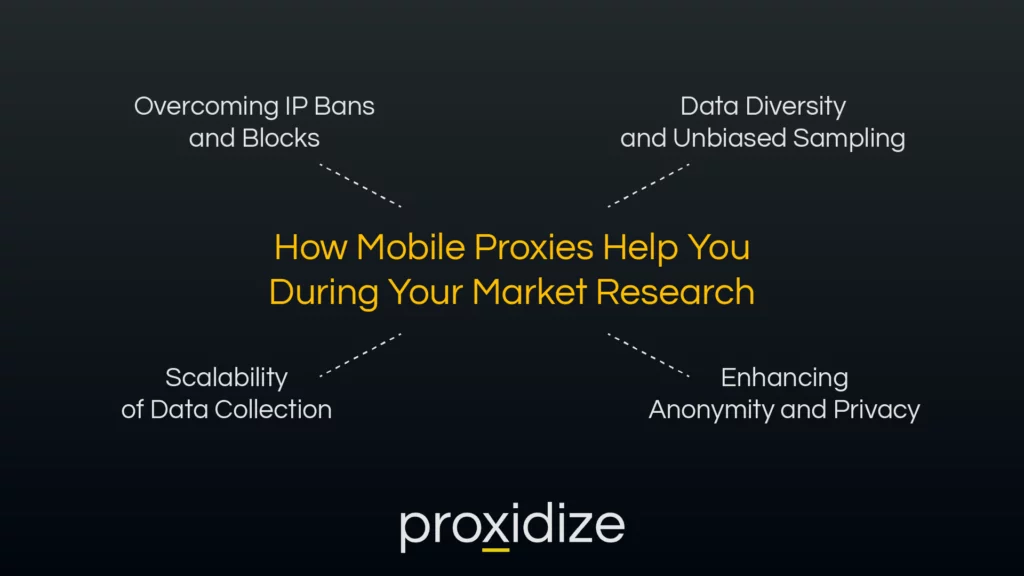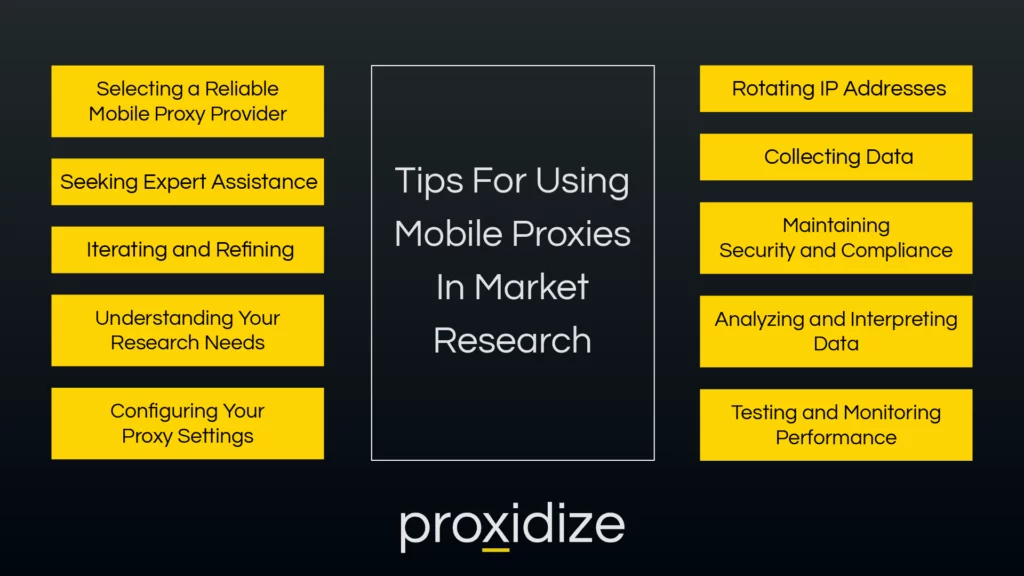Are you looking for ways to improve your market research efforts? Using mobile proxies can be a game-changer. They allow you to gather accurate data and insights by masking your IP address using a cellular network’s pool of IPs. With mobile proxies, you can overcome challenges like blocked websites and data limitations. In this article, we will explore the benefits of using mobile proxies in market research and provide practical tips on how to maximize their potential.

The Role of Market Research in Driving Business Success
Market research is instrumental in driving business success by offering invaluable insights into consumer preferences, market trends, competitor strategies, and emerging opportunities. It plays a vital role in several aspects:
Firstly, understanding customer needs is crucial. Market research assists businesses in comprehending the requirements, preferences, and behaviors of their target audience. By collecting data on consumer demographics, purchasing habits, and psychographics, companies can effectively tailor their products or services to meet customer demands.
Secondly, market research aids in identifying market trends, enabling companies to stay ahead of industry shifts and anticipate changes in consumer preferences. Through the analysis of market data and competitor activities, businesses can spot emerging trends and adjust their strategies accordingly, ensuring they remain competitive.
Thirdly, assessing market potential is essential. Market research helps companies evaluate the demand for their products or services in specific markets. By conducting market segmentation and analyzing market size, growth rates, and penetration levels, businesses can identify lucrative opportunities and allocate resources effectively.
Furthermore, market research enhances marketing effectiveness. By providing insights into the most effective marketing channels, messages, and strategies for reaching target customers, businesses can tailor their marketing efforts to resonate with their audience, resulting in higher engagement and conversion rates.
Lastly, market research aids in optimizing pricing strategies. By conducting pricing surveys, analyzing competitor pricing, and assessing consumer willingness to pay, businesses can set prices that maximize profitability while remaining competitive.
In summary, market research empowers businesses to make informed decisions, mitigate risks, and seize opportunities, ultimately driving long-term success and sustainable growth.

What Challenges Will You Face During Market Research?
During market research, one significant challenge is obtaining accurate and diverse data while maintaining anonymity and avoiding detection. Traditional methods of data collection, such as surveys and web scraping, can be hindered by restrictions, such as IP bans or location-based limitations. This can lead to incomplete or biased data, impacting the quality of insights and analysis.
Furthermore, ensuring privacy and anonymity is crucial, especially when collecting data from competitors or sensitive sources. Without proper measures in place, researchers risk exposing their identity and compromising the integrity of their research efforts. Another challenge is scaling data collection to meet the demands of large-scale research projects. Limited access to diverse IP addresses can hinder researchers’ ability to gather sufficient data efficiently, resulting in delays and resource constraints. Overcoming these challenges is essential for conducting effective market research and deriving actionable insights for informed decision-making.

How Can Mobile Proxies Help You During Your Market Research
To maximize your efficiency and accuracy in market research, mobile proxies can greatly assist you by consistently providing reliable access to target websites. Mobile proxies, also known as proxy servers, allow you to use a pool of IP addresses associated with mobile devices. This means that when you use a mobile proxy, the website you are accessing sees the IP address of a mobile device instead of your real IP address. This can be extremely valuable in market research as it allows you to gather data from different IPs and avoid being blocked or flagged by websites. Mobile proxies are one of the most effective types of proxies for market research because they offer a larger pool of IP addresses compared to other types of proxies and are less likely to be detected as a proxy network.
Here are some challenges that mobile proxies help solve when it comes to market research:
- Overcoming IP Bans and Blocks: Mobile proxies rotate IP addresses, allowing researchers to bypass restrictions imposed by websites or online platforms. This ensures uninterrupted access to valuable data without the risk of being blocked.
- Enhancing Anonymity and Privacy: Mobile proxies hide the user’s true IP address, ensuring anonymity and privacy during data collection. This is particularly beneficial when gathering sensitive information or conducting competitive analysis, safeguarding the researcher’s identity.
- Ensuring Data Diversity and Unbiased Sampling: By rotating through a pool of mobile IPs, proxies facilitate the collection of diverse and unbiased data. This improves the representativeness of the sample, leading to more accurate insights and analysis.
- Scalability of Data Collection: Mobile proxies enable researchers to scale their data collection efforts efficiently. With access to a large pool of IPs, researchers can gather large volumes of data without being constrained by IP limitations, speeding up the research process and enhancing productivity.
By leveraging mobile proxies, businesses can access diverse data sources, maintain anonymity, and scale their research efforts effectively. As a result, mobile proxies play a crucial role in streamlining market research processes and enabling businesses to make informed decisions based on accurate and comprehensive insights.

How to Use Mobile Proxies In Market Research?
When conducting market research, utilizing mobile proxies can be easily incorporated into your strategy by following a few simple steps:
- Selecting a Reliable Mobile Proxy Provider: Begin by researching and selecting a reputable mobile proxy provider. Look for providers with a track record of reliability, security, and customer support.
- Understanding Your Research Needs: Clearly define your market research objectives and the specific data you need to collect. Determine the websites and platforms you’ll be accessing, as well as any geographic or demographic targets.
- Configuring Your Proxy Settings: Once you’ve chosen a mobile proxy provider, follow their instructions to configure your proxy settings. This typically involves inputting the proxy IP address and port number into your browser or software settings.
- Rotating IP Addresses: Many mobile proxy providers offer the option to rotate IP addresses automatically or manually. Depending on your research needs, you may want to rotate IPs periodically to avoid detection or access data from different locations.
- Testing and Monitoring Performance: Before diving into your market research, conduct thorough testing to ensure your mobile proxies are working correctly. Monitor performance, including connection speed, reliability, and IP rotation, to address any issues promptly.
- Collecting Data: With your mobile proxies configured and tested, begin collecting data from your target websites and platforms. Be mindful of any terms of service or usage restrictions to avoid violating website policies.
- Analyzing and Interpreting Data: Once you’ve gathered sufficient data, analyze and interpret the findings to extract actionable insights. Consider demographic trends, consumer behavior patterns, and competitor strategies to inform your business decisions.
- Maintaining Security and Compliance: Throughout the market research process, prioritize security and compliance with relevant laws and regulations. Protect sensitive data, adhere to privacy guidelines, and respect the terms of service of the websites you’re accessing.
- Iterating and Refining: Market research is an iterative process, so continuously evaluate and refine your approach based on the insights you uncover. Adjust your proxy settings, data collection methods, and research objectives as needed to optimize results.
- Seeking Expert Assistance: If you encounter challenges or require assistance, don’t hesitate to reach out to your mobile proxy provider or consult with market research experts for guidance and support.
By following these steps and leveraging mobile proxies effectively, you can conduct comprehensive market research that informs strategic decision-making and drives business growth.
Conclusion
In conclusion, mobile proxies offer valuable assistance in market research by providing a solution to the challenges faced during the process. They allow researchers to overcome limitations and gather accurate data by simulating diverse IPs and devices. With the ability to access websites anonymously and avoid IP blocking, mobile proxies enhance the efficiency and effectiveness of market research efforts, ultimately contributing to improved business success.
Frequently Asked Questions
Can I use multiple proxies in market research?
Yes, you can use multiple proxies. By using multiple proxies, you can enhance the efficiency and accuracy of data collection by gaining access to region-specific content, avoiding IP blocks, and ensuring anonymity. Doing so allows researchers to gather a broader and more representative sample of data from different geographical locations.
Can proxies help with international market research?
Yes! By using proxies in different countries, marketers can access localized content, understand regional market trends, and gather data that is geographically restricted. This is crucial for analyzing consumer behavior, pricing strategies, and market conditions in various regions, providing a comprehensive view of the international market landscape.
How is marketing research different from competitive marketing intelligence?
Market research covers the understanding of the overall market environment like consumer behavior, market trends, product demand, and customer preferences. On the other hand, competitive marketing intelligence specifically targets understanding and analyzing competitors’ strategies, strengths, weaknesses, and activities.




